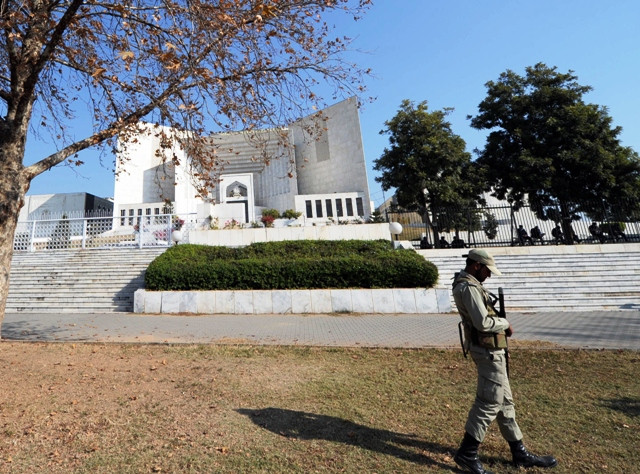Unprecedented Move: Why an eight-member bench?
In case of an even split on an appeal by the prime minister, the seven-judge bench order shall be applicable.

Unprecedented Move: Why an eight-member bench?
Why is Justice Tassadduq Hussain Jillani not part of the bench hearing Prime Minister Yousaf Raza Gilani’s appeal against contempt proceedings?
Jurists believe the second most senior judge after Justice Shakirullah Jan must have opted against becoming part of the bench Chief Justice Iftikhar Muhammad Chaudhry formed here on Wednesday to hear the prime minister’s appeal. Former Supreme Court Bar Association President Hamid Khan told The Express Tribune that the judge might have ‘recused’ himself because he is related to the prime minister.
Justice Jillani’s absence creates what the jurists call an unusual situation because benches are normally formed in odd instead of even numbers. “This is usually done to avoid an even split between the judges,” says prominent jurist Salman Akram Raja.
“Ordinarily, this does not happen. Benches usually have five, seven or nine judges to avoid complications in matters where judges have different opinions,” said Abid Hasan Minto.
Another judge could have been part of the bench if someone else would have been appointed after the retirement of Justice Sair Ali. At present the apex court requires another judge to complete its designated strength of 17 judges.
None of the seven judges, who have summoned the prime minister on February 13 for the framing of charges, are part of the bench hearing appeal against their order. “In this case you can’t even refer the matter to a referee judge,” Salman Raja said.
In high courts, where division benches are formed to hear tax matters, a case might be referred to third judge (called a referee judge), in case the two judges split over a decision.
Judges decide against hearing a case for several reasons – ranging from shaking off their personal likings and dislikings, giving their opinion in a matter heard earlier or on the basis of knowing either of the party in litigation.
The US Supreme Court Chief Justice John Roberts recused himself in an appeal filed by Salim Ahmed Hamdan – the driver of Osama bin Laden – whose case led to the decision against the trial of Guantnamo Bay prisoners by military commissions, Khan said. Justice Roberts had voted against Hamdan’s appeal, shortly before being nominated for chief justice of the Supreme Court.
Jurists say in case of an even split on an appeal by the prime minister, the seven-judge bench order shall be applicable.
Published in The Express Tribune, February 9th, 2012.


















COMMENTS
Comments are moderated and generally will be posted if they are on-topic and not abusive.
For more information, please see our Comments FAQ